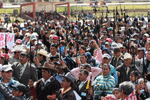Published on Thu, 2013-08-15 21:56
The commodity dependence of most African countries has intensified, despite claims of remarkable economic performance in recent times, Dr Yao Graham, Coordinator of the Third World Network Africa, has said. Addressing participants at the 14th Review and Strategy Conference of African Initiative on Mining Environment and Society (AIMES), Dr Graham said amidst the deafening rhetoric that Africa is rising; most countries on the continent continue to reel under unfavourable economic conditions. “The economies of most countries on the continent are fragile and this is going side by side with the deafening rhetoric that Africa was rising,” he said, at the opening session of the conference. |
Published on Mon, 2013-08-12 11:39
In 2000, as part of the Millennium Development Goals, governments committed to Goal 8 on a “Global Partnership for Development.” While the other 7 goals dealt with issues that were measurable at the domestic level (percentage of people in poverty, maternal mortality rates, etc.) the Global Partnership for Development was meant to address areas where international cooperation was seen as necessary to make progress towards the goals. But, what were the consequences for human rights and capabilities of how such international cooperation was conceptualized in MDG 8, and of the targets and indicators that were attached to it as representative of progress? |
Published on Wed, 2013-08-07 09:26
The so-called Arab Spring countries are passing through hard conditions, having repeatedly failed in handling the most important causes of the popular revolutions and uprisings, especially the issues of social justice, public freedoms and the establishment of security. The Arab NGO Network for Development (ANND) is aware that political transition periods in all countries where civil conflicts or popular uprisings take place are always difficult and complicated, yet several Arab countries were pushed by many factors into additional dilemmas that could have been avoided under clear visions and honest wills and if the priorities of social mobility and ultimate national goals were sustained. |
Published on Tue, 2013-08-06 00:00
In the past few weeks, the human rights situation in Bahrain has rapidly deteriorated ahead of planned mass protests on August 14th. With many of the country’s most prominent Human Rights Defenders behind bars, local NGOs have inadequate resources to keep up with the unfolding situation, and it is challenging for them to ensure the safety of their members. Bahraini HRDs should not be left to stand alone. We urge international human rights organizations to attempt to visit Bahrain over the coming week, in order to document and monitor ongoing protests, especially on August 14 when Bahrain is expected to come under lockdown. The government has already declared that all protests in the capital Manama are banned. |
Published on Mon, 2013-08-05 00:00
Ahead of the International Day of the World’s Indigenous People, the United Nations human rights chief today urged States to do more to honour and strengthen their treaties with indigenous peoples, no matter how long ago they were signed. “Even when signed or otherwise agreed more than a century ago, many treaties remain the cornerstone for the protection of the identity, land and customs of indigenous peoples, determining the relationship they have with the State,” High Commissioner for Human Rights Navi Pillay said in a statement. |
SUSCRIBE TO OUR NEWSLETTER







